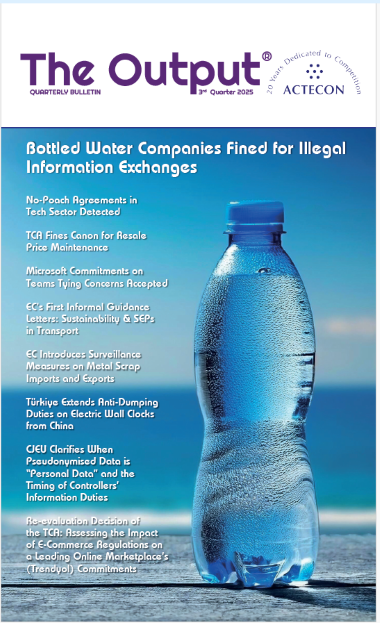Google Finally Complies Fully With Turkish Competition Authority Obligations
| Competition Law

Article By Erdem Aktekin
Introduction
Following our earlier analysis of Google’s ongoing struggle to meet the obligations set by the Turkish Competition Authority (“TCA”), a new decision by the TCA brings a change in the narrative. The newly published decision dated 04.06.2024 and numbered 24-24/562-236 (“Compliance Decision”), the Board now confirms that Google has remedied its non-compliance in hotel search queries within the local search services market. After in just 37 days, Google implemented the remaining measures previously found deficient, thereby ceasing the daily administrative fine. In this follow-up article, we revisit the background of the case, outline the new developments, and examine the Board’s reasoning that led to the cessation of the daily fine.
Background Recap
Earlier Findings and Mandated Remedies
In the earlier decision taken after an investigation, the Board had established that Google held a dominant position in Türkiye’s general search services market and abused its position by privileging its own local search (Local Unit) and accommodation price comparison services (Google Hotel Ads, GHA). The Board’s decision imposed an obligation on Google to ensure that its own offerings did not disadvantage rival providers on the general search results page. Google was required to implement distinct measures covering both local search services and accommodation price comparison services.
To that end, Google was mandated to complete its compliance within six months from the decision’s notification. Over an extended period, Google sought and was granted several extensions, eventually submitting a final compliance package that, despite improvements, did not extend to hotel search queries within local search results. This led to a subsequent decision dated 09.05.2024 and numbered 24-22/499-210 that imposed a daily administrative fine based on 0.05% of Google’s turnover starting from 15.04.2024 until the obligations are fully met.
The primary contention focused on the fact that while Google had implemented several measures, its new designs failed to incorporate modifications for hotel queries. Specifically, the obligation to create a specialized free unit for hotel results, adjust the click behavior on search result pages, and remove redirection to Google services such as Google Maps on hotel-related queries remained unmet.
New Developments: The Compliance Decision
Overview of the Compliance Decision
The Compliance decision revisits the compliance matter in light of fresh developments. In its detailed examination, the Board reviewed the communications and evidence submitted by Google regarding the implementation of its new local search designs. According to the decision, Google had, in a subsequent submission, demonstrated that it had extended its remedy to cover hotel queries as well.
Prior to this latest decision, reports and demonstrative evidence from both the Competition Board’s rapporteurs and Google’s own communication dated 16.05.2024 and 22.05.2024 had shown that Google began implementing the missing measures across desktop and mobile interfaces. Specifically, Google stated that:
– A specialized free unit (referred to as the “Yer Siteleri” section) for local search results targeting hotels was added,
– The click behavior on search result pages was modified so that a click on a hotel query would direct users to a dedicated search result viewer rather than redirecting them to another Google service, and
– The functionality that previously redirected users to Google Maps upon clicking a map result was removed.
The Board’s investigation, supported by scrutinizing various search queries—for example, “Antalya otelleri (Hotels in Antalya)”—confirmed that the previously missing modifications had now been implemented properly. Visual comparisons from both desktop and mobile environments illustrated that in the updated layout, clicks on elements related to hotel queries no longer triggered redirection to Google Maps or any separate Google service; instead, they were integrated within a coherent search result viewing experience. Also, the newly introduced “Yer Siteleri” (Local Sites) chip and dedicated section now offered users a consistent and enriched presentation of free hotel search results, aligning the hotel query experience with that of other local search results.
In its comprehensive review, the Board underscored once again that the obligations under the Local Search Services Decision were not limited to typical local search queries but extended unequivocally to hotel searches as well. The Board reiterated that, under the earlier decisions, Google was required to ensure that its own local search results did not disadvantage rival services in any segment, including hotel queries.
The new evidence demonstrated that Google’s updated design now provided a specialized free unit for hotels, a modified click path that prevented improper redirection, and a refined user interface that matched the Board’s original requirements.
Consequently, the Compliance Decision concluded that the daily administrative fine imposed on Google—calculated based on 0.05% of its revenue for the period starting 15.04.2024 and originally scheduled to continue until effective remedy—could now be terminated as of 21.05.2024, resulting in a total fine of 1.85% of Google’s 2023 Turkish turnover.
Conclusion
The Compliance Decision from the Turkish Competition Board marks a significant turning point in the long-standing case against Google. After more than three years of struggling to meet its competitive obligations, Google has now also remedied its non-compliance regarding hotel search queries within its local search services achieving full compliance with the original decision on the matter. This follow-up not only highlights the Board's diligent enforcement of competition law but also reinforces the importance of clearly designed, comprehensive remedies for effective market regulation in the digital age.





